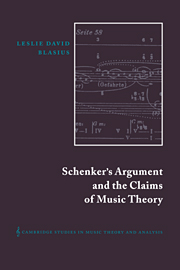Summary
Among all of the possible theories of music theory, I like to imagine that there is one which might stem from a sociology of the musical discourse (the body of writings in and about music as a whole) and its institutional manifestations. Music theory, within such a sociology, would be defined as a social construction or as a type group behavior rather than as an explanatory mode, and its characteristics explicated in terms of its relations with other group behaviors (such as historical musicology, composition, or musical criticism). Such an investigation might assemble an empirical apparatus of such things as questionnaires, field interviews, and the examination of publication records and hiring and tenure practices, analyze this data in terms of local systems of scales and correlations, and arrive at hypothetical structures of competition and accommodation. Among plausible local studies I can imagine one that attempts to correlate over a specific span of time composers' claims to a theoretical justification for their practice with (let us say) theorists' claims for access to an experiential rather than abstract truth. I can imagine another that examines the institutionalization of different discourses (such as the assignment of a pedagogical priority to music theory and a disciplinary superiority to historical musicology) and the social hierarchies implied by this institutionalization, or a third that reconstructs the ways in which music theory, historical musicology, and music criticism arrive at a division of the corpus of music and the dynamics which underlie this division.
While this hypothetical sociology, were it a reality, might tell us more than we would wish to know, its plausibility points up certain intuitive truths.
- Type
- Chapter
- Information
- Schenker's Argument and the Claims of Music Theory , pp. xiii - xxPublisher: Cambridge University PressPrint publication year: 1996

